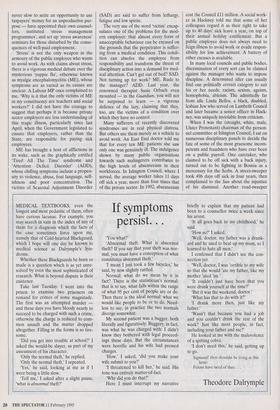If symptoms
persist.. .
MEDICAL TEXTBOOKS, even the longest and most pedantic of them, often have curious lacunae. For example, you may search in vain in the index of any of them for a diagnosis which the facts of the case sometimes force upon me, namely that of Cold-hearted Blackguard, which I hope will one day be known to medical science as Dalrymple's Syn- drome.
Whether these Blackguards be born or made is a question which is as yet unre- solved by even the most sophisticated of research. What is beyond dispute is their existence.
Take last Tuesday. I went into the prison to examine two prisoners on remand for crimes of some magnitude. The first was an attempted murder and these days you have bloody nearly to succeed to be charged with such a crime, otherwise the charge is reduced to com- mon assault and the matter dropped altogether. Filling in the forms is so tire- some.
Did you get into trouble at school?' I asked the would-be slayer, as part of my assessment of his character.
`Only the normal theft,' he replied. `Only the normal theft,' I repeated. `Yes,' he said, looking at me as if I were being a little slow.
`Tell me,' I asked after a slight pause, `what is abnormal theft?' `You what?'
`Abnormal theft. What is abnormal theft? If you say that your theft was nor- mal, you must have a conception of what constitutes abnormal theft.'
`I mean I just took a few bicycles,' he said, by now slightly rattled.
Normal: what do we mean by it in fact? There is the statistician's normal: that is to say, what falls within the range of what 95 per cent of people are or do. Then there is the ideal normal: what we would like people to be or to do. Need- less to say, in practice the two normals diverge somewhat.
My second patient was a bugger, both literally and figuratively. Buggery, in fact, was what he was charged with: I didn't know they bothered with legal proceed- ings these days. But the circumstances were horrific and his wife had pressed charges.
`How,' I asked, 'did you make your wife submit to you?'
`I threatened to kill her,' he said. His tone was entirely matter-of-fact.
`Why did you do that?'
Here I must interrupt my narrative briefly to explain that my patient had been to a counsellor twice a week since his arrest.
`It all goes back to my childhood,' he said.
`How so?' I asked.
`Well, doctor, my father was a drunk- ard and he used to beat up my mum, so learned to hate all men.'
I confessed that I didn't see the con- nection yet.
`Well, doctor, I was 'orrible to my wife so that she would 'ate my father, like my mother 'ated 'im.'
`It couldn't just have been that you were drunk yourself at the time?' `But it was the weekend, doctor.' `What has that to do with it?'
`I drank more then, just like my father.'
`Wasn't that because you had a job and you couldn't drink the rest of the week? Just like most people, in fact, including your father and me?'
He looked at me with the malevolence of a spitting cobra.
`I don't need this,' he said, getting up to go.
Sigmund! thou shouldst be living at this hour: Felons have need of thee . . .
Theodore Dalrymple


























































 Previous page
Previous page